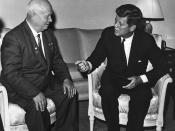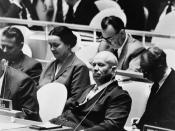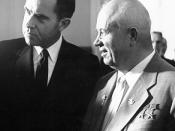Khrushchev had made three attempts to ease the tension after the Hungarian revolution. All of them had the same basis: nuclear weapons. Firstly, in December 1957 Khrushchev proposed banning all nuclear missiles from Poland, Czechoslovakia and Germany. Then on January 9th 1958 Khrushchev proposed summit level talks with Eisenhower on creating a nuclear free central Europe and limiting bomb tests, which Eisenhower rejected. Then on March 31 1958 the USSR unilaterally halted nuclear testing.
I believe that when Khrushchev took the above actions he had the following in mind. Firstly, peaceful coexistence which he proposed earlier to oppose the view that a war between communism and capitalism was inevitable. He believed in communism triumphing over capitalism by superiority. To be mentioned is the launch of Sputnik in 1957, which indeed gave the USSR superiority because it was a first; something that the West had not yet done.
Secondly, the three attempts to ease tension were good propaganda favoring the USSR, which had not long before massacred 27000 people during the Hungarian uprising, therefore the USSR's and Khrushchev's image needed to be improved.
So, by proposing a nuclear free central Europe Khrushchev would appear to be more peaceful and willing to cooperate with the West. However Sputnik gave him superiority in these actions making it look like he wasn't desperate, but that it would be in the West's best interest to cooperate because 'who knows what technology or weapons the USSR might come up with or already have'. Also, Eisenhower's refusal to have the summit made him 'look bad' and uncooperative, which was a change because usually this image was attributed to the USSR.
Thirdly, Khrushchev wanted internal reforms and for this he needed a peaceful environment. Central Europe had the most potential to attack the USSR in case the West needed to so by removing the nuclear arsenal from eastern Europe. Khrushchev hoped the West would reciprocate and therefore he could delay a possible threat. Also he realized that it would have been impossible for him to win a nuclear war so by proposing safer testing of nuclear weapons he probably hoped to restrict the number of nuclear missiles the West had.
Lastly, the USSR's unilateral halting of nuclear testing showed that Khrushchev was a man of his word and that he truly believed in what he preached. Again this was good propaganda. Also I think that this helped him gain more respect and loyalty from the communist eastern European countries which now had seen two sides of Khrushchev, the side that killed 27000 people in Hungary and the side which was willing to give up nuclear testing in order to assure the USSR's safety.
In conclusion I think that Khrushchev's actions were good especially for propaganda, but too weak to push the West to reciprocate with similar actions to halt or make nuclear testing 'safer'.


